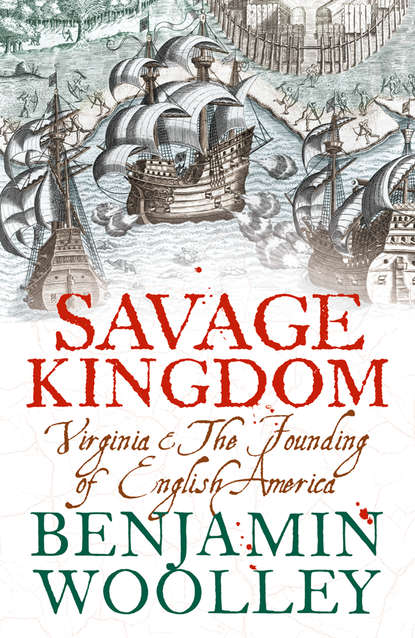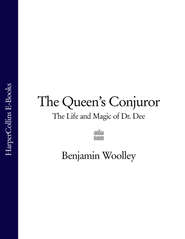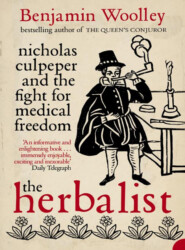По всем вопросам обращайтесь на: info@litportal.ru
(©) 2003-2024.
✖
Savage Kingdom: Virginia and The Founding of English America
Настройки чтения
Размер шрифта
Высота строк
Поля
Ahone did not grieve. He picked up the pelt, scraped the skin and sprinkled the hairs across the world, and where each hair fell, a deer sprang up. Then he returned to his hut to fetch his sack, and emptied it over the world, one man and one woman for each country. And so the world took its first beginning of mankind.
(#litres_trial_promo)
The people of each country enjoyed Ahone’s bounties, and they multiplied. They called their world Tsenacomoco, because they lived together, so many of them in the land between the sea and the mountains.
(#litres_trial_promo)
The sun rose white as pearl from the sea each morning, and fell copper red into the mountains at night. The plants yielded berries for the summertime, nuts in the autumn, and roots for the cold winters. The streams and rivers gave up fish, and the shores of the great bay they called Chesapeake, the shellfish water, because of the abundant crabs and oysters. The woodlands stretched from the feet of the mountains where rivers tumbled their waters into Tsenacomoco to the shores of the bay, and were full of deer and turkeys.
(#litres_trial_promo) And so every person lived each with the other, in all the corners of the land and creeks of the river, in every grove and every mere, which Ahone had given to each and all of them.
Then, when the mountains had grown, the world cooled and became hard.
(#litres_trial_promo) The Great Hare Ahone left, and Okeus, a scowling warrior, came. The right side of his head was shaven, and from the left side grew a long knot of hair, which draped over his shoulder.
(#litres_trial_promo) Around his neck dangled magic tokens, white pearls of the sea and red copper of the mountains. The love and devotion of Ahone was chased from the hearts of the people of Tsenacomoco and replaced by fear and awe. They stopped dawdling in the forests and treading the waters, and huddled at their hearths. Their world that once stretched from the sea to the mountains was confined to the glow of their fires.
Now, what Ahone had once freely given they had to make for themselves. To replace the forest canopy they had slept beneath, they wove sapling branches, thatched with leaves, or hides when the hunting was good. For woodland groves and clearings, they burnt undergrowth and slashed trees. For berries and seeds once harvested wild, they planted beans and corn in the winter to fetch from their gardens in summer. For fish once speared in the running waters, they built ingenious weirs to catch them.
The face of Okeus stared at them from the darkness of the forest, goading them to come to him, threatening them if they did. He made them fearful and brave, adoring the things that hurt them beyond their prevention, such as the fire, flood, lightning and thunder.
(#litres_trial_promo)
To make each of their spirits strong, the people of the Tsenacomoco mingled them together with hectic dances around the fire, upon which they cooked great feasts. And this excited Okeus.
And he divided the men from the women. The men he made to face him. To mask their fear, they dressed themselves as he did, and wore their hair as he wore his, with a long black lock on the left side hanging down. They no longer ran with the single deer, but like Okeus himself, they used fires and noise to make whole herds flee to their archers, who would stand in a half-circle to receive them, like a great maw with arrows for teeth. The women watched the home, tending the gardens and the children, keeping the fire alight for the return of the men with their meat.
Then one spring day, as the mountains opened their bowels and emptied them into the rivers, a hunter found pieces of crystal scattered in the tinctured waters.
(#litres_trial_promo) In the subtle world of Tsenacomoco, nothing so hard or sharp had ever been touched. The hunter took one of his arrows, and where a turkey spur or sliver of bone had once been its tip, used a fleck of the crystal, which he fixed with antler glue and bound with the sinew of a deer. When he fired the arrow at a tree, it pierced the wood like muscle. Like everlasting teeth, it never lost its edge.
Men now yearned for these hard, shiny things, which gave those who possessed them the power called manitu. Manitu was not like the deer in the forest or the fish of the sea; it did not die or decay, nor was it replenished with the flying of the geese or the return of the leaf. Manitu did not grow old. It was not washed away by the water or worn away by use. It could be given, taken, hoarded, seized, stolen, and those who had more were lords over those who had less. And so in time he who had most was made chief, and called weroance, to whom the rest must give any precious things they had, and tribute of venison, corn or counsel, so they might live under his protection and benefaction.
(#litres_trial_promo)
Some weroances rich in manitu built circles of wood around their villages, so the people were protected. But they could not move freely any more. Other weroances built long huts in the forest, for their secret receptions with Okeus. The special men, the quiyoughcosucks, who painted their bodies black and red in the colours of Okeus, would talk to the god in a dark vault at one end of the hut, where only the quiyoughcosucks and not even the weroances could go.
Okeus grinned at the attention given to him, and he craved more. He taunted the weroances at their desire for manitu. He goaded each to prove that he was the great one. But to become the great one, each needed more of the hard things foreign to Tsenacomoco that bestowed manitu. So one had to fight the other, to take the things in their possession, or to protect their own. The time of war followed.
The noise of battle brought people from other worlds. The Monacans came from the mountains and stood where the rivers fall. They did not speak with the same tongue nor did they know Okeus. They lived as the people of Ahone once lived, moving freely through the woods and the seasons, having no abode but the forest. For each Monacan man had all the glittering stone from the rivers and red copper from the mountains he needed, and so his own manitu.
(#litres_trial_promo) They came to the place called Powhatan, the place where the river falls. There, the weroance bought with corn and hides all the blue crystal and red copper the Monacans had.
(#litres_trial_promo)
Then, within the memory of men, the Otasantasuwak, the ones who wear trousers, came across the sea upon great swans.
(#litres_trial_promo) They were ghosts, very pale, weak and bony. Many had beards and whiskers, and they spoke a strange language, though some old men thought they had heard these voices before.
The Otasantasuwak carried sticks which could spit fire, but not with the accuracy or speed of an arrow. The fire sticks were fed with a seed that would not grow in the ground. They could not in their heavy clothes run through the forests, or move stealthily, or hunt down the stag. They had no means of sustaining themselves, but believed they lived by the bread given to them by their quiyoughcosucks, who chanted to their god using a leather pouch stuffed with leaves of white and black markings. They had crystal and copper, some of better quality than that of the Monacans, and piles of rock which lay in the gizzards of their great swans. They gave places their names, and their names places, and once these were chosen, the names stayed the same, even as everything changed.
In these dangerous times, a villager of Powhatan, Wahunsunacock, grew great in stature from these wars and encounters, and came to be chief of weroances, the mamanatowick, with power to save Tsenacomoco in these troubled times.
(#litres_trial_promo)
Wahunsunacock understood the people of other worlds, who called him Powhatan after the place of his origin that lay at the heart of his power. From them, he got more precious things than were had by any other weroance. The touch of the Otasantasuwak became deadly to any who approached them, unless they were by him permitted, be they people in his power, or other people jealous of him.
Under this rule, he fetched copper from the Monacans.
(#litres_trial_promo) From beyond the swamp, in the land of a wise chief impotent in his limbs, he fetched pearls of the purest white, unlike the grains gathered from the Tsenocomoco shores, which were the colour and hardness of rotten teeth.
(#litres_trial_promo)
It is said Wahunsunacock had received secret knowledge from the Otasantasuwak of more precious and strange things than any that had ever been known, for which he had prepared the great temple in Tsenocomoco, at the branch of a river atop a red sandy hill among the woods, in a place called Uttamussack.
Wahunsunacock had placed there seven grave men who were the quiyoughcosucks. Their chief was dressed in regalia of a stuffed snake and weasel skins, a cloak and a crown of feathers. Wahunsunacock set these priests over the things he had won, and the bones of his forefathers, and a great rock, which they planted in the ground.
(#litres_trial_promo)
At Uttamussack, Okeus was called and in a mighty rage made it known to Wahunsunacock’s priests that from the great bay a people would arise who would overthrow the mamanatowick. So Wahunsunacock declared that the people of the Chesapeake, who lived on an opposite shore of the bay that took their name, were his mortal enemies, for they had been touched by the Otasantasuwak, and so he made them extinct.
But Okeus spoke again. He said Wahunsunacock might overthrow and dishearten attempters and such strangers as should invade his territories or labour to settle amongst his people. He would do this twice, and their tribute of copper, crystal and other precious things that were due to him would make his power even greater. But of a third attempting, these people would defeat him, and he would fall unto their subjection and under their conquest.
(#litres_trial_promo) Then would white clouds of those ghosts blow across the great sea and blank out the sun, and the soft mud would dry, and the trees and plants turn to stone, and all that was supple would become hard, and all the sounds and songs of the Tsenacomoco would become trapped in the black marks upon white leaves.
SIX Soundings (#ulink_8c527e34-82ca-5923-9f89-c5390189ce8e)
THE FRAGILE FLEET of three wooden ‘eggshells’ sailed past a cape on the southerly lip of the Chesapeake Bay, and dropped anchor on the south shore. To the north, a vast body of water stretched to the horizon. To the west, low-lying land receded as far as the eye could see. The English had found Virginia.
(#litres_trial_promo)
‘There we landed and discovered a little way,’ wrote Percy, who was a member of the first thirty-strong landing party to go ashore that warm spring day in late April 1607. ‘But we could find nothing worth the speaking of but fair meadows and goodly tall trees, with such fresh waters running through the woods as I was almost ravished at the first sight thereof.’
They stayed all afternoon, using the remains of a long day to take in their new surroundings. As darkness fell, they made their way back to the beach. Then, ‘there came the savages creeping upon all fours from the hills like bears, with their bows in their mouths, [who] charged us very desperately’. The English let off volleys of musket fire, which to their surprise the Indians ‘little respected’, not withdrawing until they had used up all their arrows. Gabriel Archer was injured in both his hands, and Matthew Morton, a sailor, was shot ‘in two places of the body very dangerous’. The casualties were carried back on to the boats, and the English withdrew to their ships.
(#litres_trial_promo)
Later that evening, there was a solemn gathering of all the leading members of the expedition aboard the Susan Constant. According to their orders from the Royal Council, within twenty-four hours of their arrival at Virginia, they were to ‘open and unseal’ the secret list nominating the settlement’s ruling council, ‘and Declare and publish unto all the Company the names therein Set down’.
(#litres_trial_promo)
Newport announced the names chosen by the Royal Council in England. His own was listed first, followed by Wingfield’s and Gosnold’s. Another nomination was John Martin, the sickly son of Sir Richard, a prominent goldsmith and the Master of the Mint. Martin’s election was probably a foregone conclusion, given the wealth of his family and their generosity as patrons of this and other ventures.
(#litres_trial_promo)
More surprising was the appearance of the mysterious George Kendall and John Ratcliffe on the list, together with Captain John Smith. The latter’s inclusion might have suggested his immediate release from the brig, but Newport decided to keep him there for the time being.
George Percy and Gabriel Archer were not nominated. Percy may have been excluded because of worries about the loyalty of his brother, the Earl of Northumberland. The reasons for excluding Archer, who had worked so hard with Gosnold to promote the venture in its early years, were more opaque, and he took the news badly.







